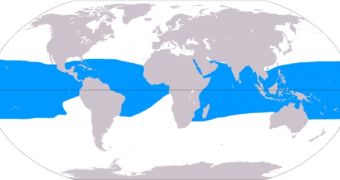Representatives from 6 nations will be meeting in Australia this week to discuss the worsening state of affairs regarding the coral reefs in the region. Indonesia, Malaysia, the Philippines, Papua New Guinea, Timor Leste and the Solomon Islands comprise the Coral Triangle (CT), a region where about one third of the world's reefs are located. The level of marine wildlife diversity in the area is incredible, with habitats housing well over 3,000 fish species, as well as the largest mangrove forests in the world.
All this biodiversity is threatened by a number of severe factors, including sedimentation from coastal development, pollution, ocean acidification, illegal and over-fishing, as well as from coral bleaching. Together, these elements can upset the balance of the reefs, plunging the $2.3 billion industry into disorder. The 5.7 million square kilometers of the area house approximately 200 million people, most of whom are entirely dependent on the ocean and its yield for their very survival.
"Everyone recognizes that coral reefs, and the economic and social benefits they generate, are at risk. Fish, corals and climate change don't respect national boundaries – so the need for region-wide action is paramount," explained Professor Terry Hughes, director of Australian Research Council's Center of Excellence for Coral Reef Studies (CoECRS).
He added "This is a critical initiative by many countries, acting together for the first time, to sustain the livelihoods of millions of people. In developing countries, millions of local people suffer real hardship when reefs and ocean habitats are degraded. There is a social and economic imperative to protect them."
"Better collaboration between Coral Triangle experts and Australian experts may well be a fundamental requirement to ensure the knowledge base is in place to prevent an environmental crisis to our north and ensure longer term regional fisheries and food security," said Frank Tirendi, acting research director at the Australian Institute of Marine Science (AIMS), in regard to why Australia decided to host the international conference.

 14 DAY TRIAL //
14 DAY TRIAL //